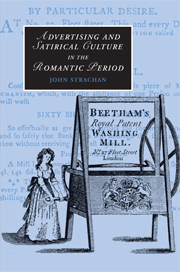Book contents
- Frontmatter
- Contents
- List of illustrations
- Acknowledgements
- Introduction
- 1 A ‘department of literature’: Advertising in the Romantic period
- 2 ‘Humbug and Co.’: Satirical engagements with advertising 1770–1840
- 3 ‘We keeps a poet’: Shoe blacking and the commercial aesthetic
- 4 ‘Publicity to a lottery is certainly necessary’: Thomas Bish and the culture of gambling
- 5 ‘Barber or perfumer’: Incomparable oils and crinicultural satire
- 6 ‘The poetry of hair-cutting’: J. R. D. Huggins, the emperor of barbers
- Conclusion: ‘Thoughts on puffs, patrons and other matters’: Commodifying the book
- Notes
- Bibliography
- Index
- CAMBRIDGE STUDIES IN ROMANTICISM
2 - ‘Humbug and Co.’: Satirical engagements with advertising 1770–1840
Published online by Cambridge University Press: 22 September 2009
- Frontmatter
- Contents
- List of illustrations
- Acknowledgements
- Introduction
- 1 A ‘department of literature’: Advertising in the Romantic period
- 2 ‘Humbug and Co.’: Satirical engagements with advertising 1770–1840
- 3 ‘We keeps a poet’: Shoe blacking and the commercial aesthetic
- 4 ‘Publicity to a lottery is certainly necessary’: Thomas Bish and the culture of gambling
- 5 ‘Barber or perfumer’: Incomparable oils and crinicultural satire
- 6 ‘The poetry of hair-cutting’: J. R. D. Huggins, the emperor of barbers
- Conclusion: ‘Thoughts on puffs, patrons and other matters’: Commodifying the book
- Notes
- Bibliography
- Index
- CAMBRIDGE STUDIES IN ROMANTICISM
Summary
They are hooting the empiric,/ The ignorant and incapable fool.
Robert Browning, Paracelsus (1835)In 1825, The Times published a ‘Parody of a Cambridge Examination Paper’ in which students, instead of being assessed on their knowledge of scripture or the classical languages, were examined on subjects of decidedly more interest to the would-be fashionable Corinthian: London theatres, the finest tailors and shoemakers, and the pleasures of the Fancy (‘Who was Prime Minister when Cribb defeated Molyneux? and where did the battle take place? Explain the terms – “milling, fibbing, cross-buttock, neck and crop, bang up, and prime”’). Advertisers feature heavily in the examination, with the candidates being asked to ‘enumerate the patentees … of liquid blacking’ and to engage in practical criticism of a sole-proprietor jingle by a poetical barber-surgeon:
15. Scan these lines:
‘But for shaving and tooth-drawing,
Bleeding, cabbaging, and sawing,
Dicky Gossip, Dicky Gossip is the man!’
What is known of the character and history of Dicky Gossip?
The examination also tests students' command of the best-advertised quack medicines, beginning with an exhortation to sketch the topography of Samuel Solomon's premises in Liverpool and concluding by asking candidates to demonstrate a sound knowledge of some of the principal brands of proprietorial medicines:
5. Give a ground-plan of Gilead-house. Mention the leading topics of the Guide to Health, with some account of Fothergill's Cough Pills, Daffey's Elixir, Blain's Distemper Powders, Beddome's Powders for Children, and Hooper's Female Pills.
- Type
- Chapter
- Information
- Advertising and Satirical Culture in the Romantic Period , pp. 72 - 116Publisher: Cambridge University PressPrint publication year: 2007



